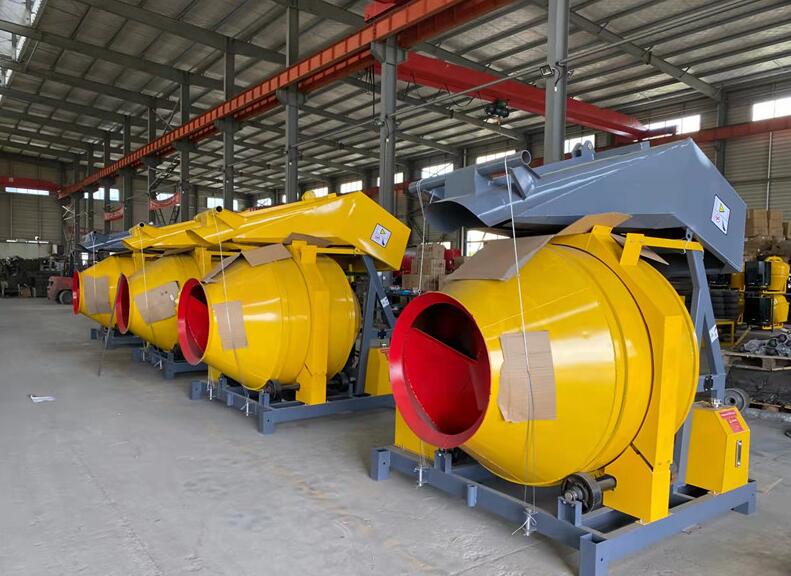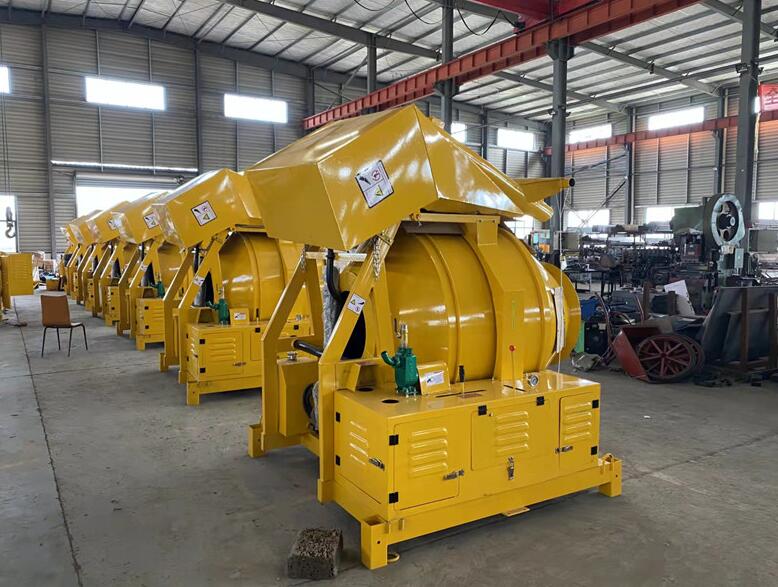Which Concrete Mixer Is Right for Your Project?
When do I need a concrete mixer?
As most people know, not all projects require a concrete mixer, but there are certainly some that do. The key is to determine which projects require a concrete mixer and then proceed to find the right concrete mixer for your particular project. Some of the projects that you may think don't need a mixer are things like laying bricks or working on a driveway. While the scope of the project does affect the need for a concrete mixer, both of these projects can be done without one.
Projects that definitely require a concrete mixer are things like paving a deck, fixing major cracks and failures in a driveway, or any concrete job with a scope larger than what a bucket of concrete or concrete wheelbarrow can handle. Considering your project and the size of the project before you start will help you determine if you need a mixer, or if you just need a mixing container.

concrete mixer
Determining the Need for a Concrete Mixer
The first step in determining if you need a concrete mixer is to see how large your project is and how long it will take to complete. If you are just fixing a crack here or there, or just going to set a few rocks, you may not need a mixer. Likewise, if you are working quickly and want to complete the project in about an hour, the need for a concrete mixer is minimal. However, for larger projects that require a lot of concrete and a long time to complete, such as a patio, a mixer is a necessity.
So what does a concrete mixer do for your project? First of all, it helps keep the concrete moving so that it stays pliable and liquid while working for the best results. It also helps keep the concrete inclusive so you can use it as needed.
Choosing Your Concrete Mixer
The main factor to consider when choosing a concrete mixer is the size of the concrete mixer itself. For larger projects, such as pouring concrete pads or foundations for houses and other structures, there are industrial-sized mixers. There are residential sized concrete mixers for home projects, and there are small portable concrete mixers for completing at home that are fast and may not require much work or mixing. These will be easy to use quick mixers.
If you are not sure if you need a mixer or if you need a lot of cement, you can always hire a concrete or cement company to deliver the amount you need by truck. When choosing a concrete mixer, you need to keep your project in mind and choose the right size for the project you must complete.

concrete mixer
5 Key Considerations When Buying a Concrete Mixer
With the wide variety of mixer brands on the market, it is important that you choose the right mixer wisely. Here are some basic things you should consider when buying a concrete mixer for your construction job. Let's dive in.
1. Size
The ideal size of the mixer depends on the type of job. Small compact mixers are easy to move around and take up little space on job sites and in garages. For smaller jobs, a small concrete mixer will get the job done. On the other hand, if you plan to mix a lot of concrete at once, a large capacity concrete mixer will come in handy. Typically, the larger mixers have a capacity of 6 cubic feet. To put this in perspective, a 3.5 foot cubic capacity drum can hold about 80 pounds of concrete.
2. Performance and Capacity
This is a very simple point. If you want to increase the productivity of your construction work, you should invest in a cement mixer that performs amazingly well. For example, large projects require large units for better and faster performance. Large mining machines produce a lot of concrete and thus save time. Again, you must consider the motor power rating of the machine. A powerful concrete mixer mixes all concrete components properly. For example, a mixer with a 1500 RPM motor will provide the best results. In other words, it spins 3000 times in 2 minutes, thus providing consistent concrete. Again, a high motor rating like ¾ HP provides relatively better performance.
3. Power Supply
There are two main options for cement mixers: fuel and electric mixers. The type of power supply you need will determine the right mixer for the job. In other words, you should make sure you have power when you purchase your electrical equipment. Gasoline engines, on the other hand, allow you to work independently of the power source. Typically, fuel engines are robust and mix a relatively large amount of concrete. However, they are more corrosive and less environmentally friendly compared to electric motors. Diesel engines are also available in the market. The biggest advantage of fuel mixers is that they can work in remote areas where there is no power supply.
4. Portability
Depending on the nature of your construction job, you can choose a stationary mixer mobile unit. If you are preparing concrete on one job site, a stationary mixer is a perfect choice. However, if you move between multiple job sites, consider choosing an on-site mobile unit. For more robust and larger machines, you will need to consider a trailer-mounted mixer. The key is that portable concrete mixers are usually light weight and small enough to move around easily.
Some concrete mixers come with a unicycle. Ideally, the wheels should be strong enough to withstand the construction terrain. In addition, heavy mixers need thick, sturdy wheels to provide support and stability. The last thing you want is for the mixer to dump and decant its contents. For light mixers, dumping the contents into a traditional wheelbarrow is easy. Generally, they don't have unicycles.
5. Durability
When buying a blender, you should choose a sturdy machine that will stand the test of time. This means that the water tank and frame should be sturdy and durable. In other words, it reduces the risk of dropping the mixer when it is placed on rough terrain. Keep in mind that construction tools experience a lot of wear and tear on the job site.
Build quality is the most important consideration. Fortunately, some options come with extended warranties of up to two years. The good news is that motor blends are designed with IP45 and 1P55 water resistance ratings. They protect against damage caused by water used in concrete, which increases durability.
Steel and plastic are the most common materials used to manufacture concrete mixer drums.
Plastic or polyethylene drums are lighter in weight and easier to clean. However, the wear and tear of concrete can cause faster wear and tear. Steel drums, on the other hand, have a long life. However, they tend to be heavier, harder and require more powerful motors. What's more, steel machines offer longer durability compared to aluminum machines.
Choose the best
The choice of concrete mixer can affect the output of a construction job. Choose carefully the concrete mixer that can handle construction work seamlessly. Shengmao stocks a variety of concrete mixers. You can rest assured that you will find the right machine for your needs. If you are having trouble choosing the right mixer, contact our team today .













